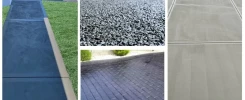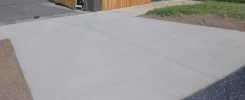A grey concrete driveway is a versatile and popular choice among homeowners. It has several advantages but also needs to be compared with other materials to determine what works best for your specific needs. Below is a detailed breakdown.
Grey Concrete Driveway Advantages
- Cost-Effective:
• Grey concrete is one of the most affordable driveway options, especially for large areas. - Durability:
• Concrete is highly durable and resistant to heavy loads, making it ideal for driveways.
• With proper maintenance, a concrete driveway can last 30+ years. - Low Maintenance:
• Requires occasional cleaning and sealing to maintain appearance and structural integrity. - Customizable:
• Grey concrete can be enhanced with staining, stamping, or etching for a decorative look without significant added cost. - Weather Resistant:
• Resists heat and UV rays better than materials like asphalt, making it a great option for warmer climates.
Disadventages of Grey Concrete Driveway
- Cracking:
• Over time, concrete may crack due to settling or freeze-thaw cycles in colder climates. Proper installation and control joints can minimize this. - Stains:
• Grey concrete is prone to stains from oil, grease, or rust unless sealed regularly. - Appearance:
• Basic grey concrete is less visually appealing compared to decorative options like pavers or natural stone unless modified. - Installation Time:
• Concrete requires curing, which can take 1-2 weeks before the driveway is fully usable.
Grey Concrete Driveway vs Asphalt
Pros:
• More affordable upfront.
• Easier and faster to install.
• Dark color hides stains and wear.
Cons:
• Requires more frequent maintenance (sealing every 2-3 years).
• Shorter lifespan (15-20 years).
• Softens in high heat, leading to deformations.
Better For:
• Budget-conscious projects or colder climates (asphalt is more flexible and withstands freeze-thaw cycles).
Grey Concrete Driveway vs Pavers (Brick or Concrete)
Pros:
• Highly customizable with a wide range of colors, patterns, and textures.
• Excellent curb appeal.
• Easy to repair (individual pavers can be replaced).
Cons:
• High upfront cost.
• Requires regular maintenance to prevent weeds and shifting.
Better For:
• Homes emphasizing aesthetics or high-end curb appeal.
Grey Concrete Driveway vs Gravel
Pros:
• Very affordable and quick to install.
• Good drainage, preventing water pooling.
Cons:
• Prone to shifting and requires frequent leveling.
• Difficult to clear snow or debris.
• Lacks durability and isn’t ideal for high-traffic areas.
Better For:
• Rural or temporary driveways.
Grey Concrete Driveway vs Natural Stone (Flagstone or Cobblestone)
Pros:
• Luxurious, natural look.
• Extremely durable with a long lifespan.
Cons:
• High installation and material costs.
• Requires professional installation.
Better For:
• Premium properties or where aesthetics are prioritized over cost.
Grey Concrete Driveway vs Stamped or Colored Concrete
Pros:
• Offers the durability of grey concrete with customizable, decorative designs.
• Mimics higher-end materials like brick or stone at a lower cost.
Cons:
• More expensive than plain grey concrete.
• Stains and cracks can detract from decorative finishes.
Better For:
• Homeowners seeking a balance between durability, aesthetics, and cost.
Which is Better for your Driveway?
The “best” material for your driveway depends on your priorities:
• Grey Concrete: Best for durability, low maintenance, and affordability.
• Asphalt: Better for cold climates and those on a budget.
• Pavers: Ideal for aesthetics and flexibility in design.
• Gravel: A good temporary or budget solution with excellent drainage.
• Natural Stone: Perfect for luxury and timeless elegance.
• Stamped Concrete: Great middle-ground for durability and decorative appeal.
Recommendation
If durability, cost-effectiveness, and simplicity are key priorities, grey concrete is a great choice. However, if aesthetics are important, consider enhancing it with stamping, coloring, or sealing to mimic higher-end materials without the associated costs.


